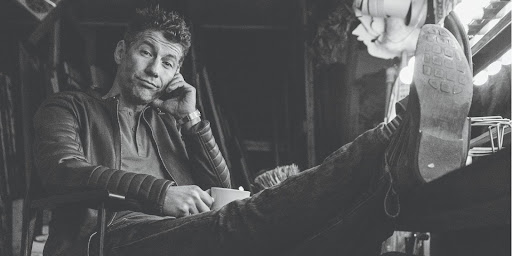Aaron Foster, a standup comic with a background as eclectic as his comedy, has emerged as a poignant, if unlikely, voice in today’s comedy scene. At age 50, Foster stepped away from a multi-decade entrepreneurial career to pursue a lifelong dream—standup comedy. Now 53, he’s touring the United States and Canada with “Mostly Jokes,” an autobiographical solo show that was awarded “Best Solo Show” at the 2025 Tucson Fringe Festival. The production, centered around his experience growing up with a bipolar father and a schizophrenic brother, delivers raw, introspective storytelling filtered through a sharply honed comedic lens.
Foster’s performance style has drawn comparisons to Mike Birbiglia, Marc Maron, and Gary Gulman. His show is less about punchlines and more about peeling back the layers of human experience—mental health, grief, regret, aging—with wit, clarity, and emotional precision. Critics and audiences alike have praised the show’s ability to blend deeply personal topics with humor. One reviewer remarked, “You will fall in love with a man who would rather you not.” Another described the performance as “Dark comedy with a huge heart,” while yet another called it “subversively funny, laugh out loud, gallows humor.” A more visceral audience response simply stated, “Jesus Christ on a bike, that is the most uncomfortable laughing I’ve had in a long time, but fuck me if that isn’t some cathartic shit right there.”
This tour is not produced by a major label or under the guidance of a manager or agent. Instead, Foster independently books theaters across small to mid-sized towns, manages logistics, and promotes the shows himself. It’s a process that reflects his broader life trajectory—entrepreneurial, self-starting, and resolutely unorthodox. “I just rent theaters, roll in, tell my jokes about the darker side of mental health, and roll out to the next town in the morning,” Foster said. “Sometimes people come to the shows, sometimes not. Regardless, I do the best show I can for whoever shows up.”
Foster’s refusal to perform crowd work, a staple for many contemporary comedians, sets him apart. “I don’t do crowd work,” he said. “That’s the biggest difference between me and most of the ‘popular’ comics today. I write my show. I’ve spent two and a half years writing this thing, which, to me at least, is a lot more interesting than asking the guy in the front row what he does for work.”
Beyond his current work in comedy, Foster’s background includes hosting a now-defunct HGTV show, acting in several independent films, and co-founding a sports-nutrition startup. He was also once a nationally recognized license plate artist whose work has been exhibited in the Smithsonian, and a restaurateur whose venue was named #12 in the country by Yelp in 2021. He no longer owns that restaurant, but the accolades remain part of his multifaceted résumé.

Despite his varied past, Foster’s focus is now fully on comedy—and not just for laughs. His storytelling on stage operates as a cathartic experience, both for himself and his audience. “Being able to make people laugh and maybe, just maybe, feel a little less alone about things like mental health, suicide, depression, loneliness, regret makes me feel less alone. Even if it’s only for that 60–90 minutes I’m on stage.”
The show’s title, “Mostly Jokes,” underscores the paradox at the core of Foster’s appeal: comedy rooted in deeply serious subject matter. From stories of survivor’s guilt to anecdotes about his family’s struggles with mental illness, Foster walks a tightrope between tragic and comedic. His performances avoid sentimentality, opting instead for a tone of hard-earned insight wrapped in expertly crafted narrative arcs.
Audiences across North America have responded with enthusiasm. “I’ve never laughed so hard about mental health,” said one reviewer. “That show rocked us,” said another. For those who have attended a performance, the experience is often described as equal parts catharsis and entertainment.
Foster’s approach to comedy reflects a generational shift in how comedians engage with their audiences. Rather than opting for fast-paced, social media–friendly content, he builds something more deliberate and introspective. His show resists the commercial algorithms of virality and leans into the tradition of long-form, confessional performance—one more often associated with solo theater than standup comedy.
Still, Foster does maintain an online presence. His official websites aaronfoster.com and mostlyjokes.com provide information about upcoming performances, tour dates, and merchandise. His Shopify site, aaronfoster.myshopify.com, features his artwork and tickets. He also engages with fans on Instagram, TikTok, and Threads, platforms where he occasionally shares tour updates and behind-the-scenes moments.

In many ways, Foster’s current trajectory exemplifies a modern reinvention narrative—not the polished, influencer-ready version, but one rooted in struggle, craft, and authenticity. “This isn’t my second chapter,” Foster said. “It’s my fifth or sixth, and I’m working my ass off to make sure I have a happy ending.”
He may joke about his relative anonymity and the modest scale of his tour, but the reception to “Mostly Jokes” suggests a growing audience for Foster’s brand of raw, self-aware comedy. His return to the stage after a long and varied career path is not just an act of personal courage—it’s a testament to the enduring power of storytelling, even—or especially—when it’s told in the form of mostly jokes.
For more information on Aaron Foster, including tour dates and reviews, visit aaronfoster.com, mostlyjokes.com, and this collection of reviews. Additional performance feedback from his 2024 Hollywood Fringe Festival debut is available here.
